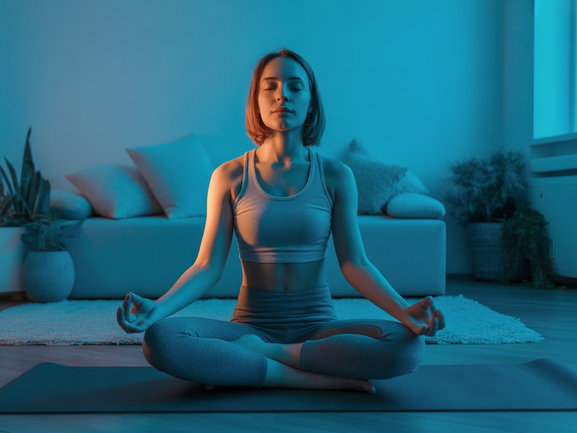Yoga Philosophy for Beginners: Starting Your Spiritual Journey at Home
Have you ever wondered why yoga feels like more than just physical exercise? When you step onto your mat, something deeper awakens – a connection that goes beyond stretching and strengthening. This is the essence of yoga philosophy for beginners, and today we’ll explore how you can embrace this transformative journey from the comfort of your home.
What Makes Yoga More Than Exercise?
Unlike other fitness routines, yoga is rooted in ancient wisdom that views the practice as a path to self-discovery. The word “yoga” itself means “union” – the connection between mind, body, and spirit. When you understand this foundation, your spiritual yoga practice becomes a powerful tool for personal growth.
Many beginners start practicing yoga at home for physical benefits, but soon discover that the real transformation happens within. This is where yoga philosophy becomes your guide.
The Eight Pillars of Yoga: Your Roadmap to Inner Peace
The ancient sage Patanjali outlined eight essential steps, known as Ashtanga or the “Eight Limbs.” Think of these as your spiritual compass:
1. Yamas (Ethical Guidelines)
- Ahimsa (Non-violence): Practicing kindness toward yourself and others
- Satya (Truthfulness): Living authentically
- Aparigraha (Non-attachment): Finding contentment without constant wanting
2. Niyamas (Personal Observances)
- Santosha (Contentment): Finding joy in the present moment
- Svadhyaya (Self-study): Continuous learning and self-reflection
3. Asana (Physical Postures)
The yoga poses you practice are designed to prepare your body for meditation and spiritual work. Each posture teaches patience, focus, and acceptance.
4. Pranayama (Breath Control)
Your breath is the bridge between body and mind. Through conscious breathing, you access deeper states of awareness and calm.
Building Your Spiritual Practice at Home
Creating a meaningful yoga at home practice doesn’t require elaborate setups or years of study. Here’s how to begin:
Start With Intention
Before each practice, take a moment to set an intention. This could be cultivating patience, finding inner peace, or simply being present. This simple act transforms your session from exercise into spiritual practice.
Create Sacred Space
Designate a quiet corner of your home for practice. It doesn’t need to be large – even a small area with a mat and perhaps a candle can become your sanctuary.
Embrace Mindfulness
During your practice, focus on the present moment. Notice how each pose feels, observe your breath, and acknowledge your thoughts without judgment. This is mindfulness yoga in action.
The Life-Changing Benefits of Spiritual Yoga
When you combine physical practice with spiritual awareness, remarkable changes occur:
- Reduced anxiety and stress: Regular practice calms the nervous system
- Improved self-awareness: You become more attuned to your thoughts and emotions
- Enhanced emotional resilience: Challenges become opportunities for growth
- Deeper sense of purpose: Connection to something greater than yourself
Research published in the Journal of Clinical Medicine shows that combining meditation benefits with yoga significantly improves mental health outcomes.
Meditation: The Heart of Yoga Philosophy
Meditation isn’t separate from yoga – it’s the ultimate goal. Every pose, every breath, every moment of awareness prepares you for this state of inner stillness. Even five minutes of daily meditation can transform your practice and your life.
The beauty of meditation is its accessibility. You don’t need special equipment or years of training. Simply sitting quietly, focusing on your breath, and observing your thoughts is a powerful beginning.
Practical Tips for Yoga Philosophy Beginners
Start Small, Think Big
Begin with 10-15 minutes daily. Consistency matters more than duration. As the ancient wisdom teaches, “It’s better to practice a little every day than a lot once in a while.”
Study and Reflect
Read inspiring texts like the Yoga Sutras or Bhagavad Gita. However, don’t get overwhelmed – focus on one concept at a time and reflect on how it applies to your daily life.
Find Your Community
While you’re practicing at home, remember that yoga connects us all. Share your journey, ask questions, and learn from others walking similar paths.
Frequently Asked Questions About Yoga Philosophy
Do I need to be religious to practice yoga philosophy?
Not at all. Yoga philosophy is spiritual, not religious. It’s about connecting with your inner wisdom and finding peace within yourself. People of all beliefs can benefit from these teachings.
How long does it take to understand yoga philosophy?
Yoga philosophy is a lifelong journey. You’ll begin experiencing benefits immediately, but understanding deepens over time. Start with basic concepts and let your awareness naturally expand through consistent practice.
Can I practice yoga philosophy without physical poses?
Yes, many aspects of yoga philosophy – like meditation, ethical living, and mindfulness – can be practiced independently. However, physical practice often enhances spiritual understanding by connecting mind and body.

